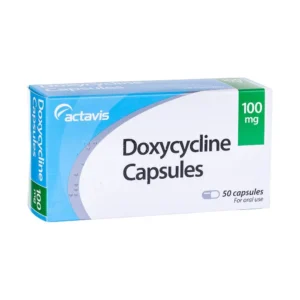Why Is This Medication Used?
Doxycycline is prescribed to manage a range of bacterial infections. It’s also utilized for treating or preventing anthrax exposure (a serious bacterial infection that can be used in bioterrorism), as well as for managing plague and tularemia (infections that may also be linked to bioterrorism). Additionally, doxycycline serves as a preventive treatment for malaria and is used alongside other medications to address acne and rosacea (a skin condition characterized by redness, flushing, and pimples). A specific form, Doxycycline (Oracea), targets pimples and bumps caused by rosacea.
This medication belongs to a group called tetracycline antibiotics, which work by inhibiting bacterial growth and spread. For acne, doxycycline helps by reducing bacteria in clogged pores and controlling the production of natural oils. For rosacea, it alleviates inflammation responsible for symptoms.
Antibiotics like doxycycline are ineffective against viral infections such as colds or the flu. Misusing antibiotics can increase the risk of developing antibiotic-resistant infections in the future.
How Should You Take This Medication?
Doxycycline is available in capsules, tablets, delayed-release tablets, and liquid suspensions for oral use. Typically, it’s taken once or twice daily with a full glass of water. If you experience stomach upset, you may take it with food or milk, but consult your doctor or pharmacist for specific advice. Always follow the prescription instructions carefully, and do not adjust your dosage without consulting your healthcare provider.
For delayed-release tablets, swallow them whole without splitting, chewing, or crushing. If swallowing is difficult, certain delayed-release tablets (like Doryx) can be broken and sprinkled on a spoonful of cool applesauce, ensuring the pellets remain intact. Consume immediately without chewing.
Shake the liquid suspension well before use to ensure even distribution.
If taking doxycycline to prevent malaria, start 1–2 days before traveling to malaria-prone areas and continue daily during your stay and for four weeks after leaving. Do not use doxycycline for malaria prevention for longer than four months.
Continue the medication even if you feel better, unless instructed otherwise by your doctor. Ensure you receive the specific form of doxycycline prescribed to you, and consult your pharmacist if there are any doubts.
Additional Uses
Doxycycline may be prescribed to manage Lyme disease or prevent it after a tick bite. It can also be used to treat or prevent certain sexually transmitted infections (e.g., gonorrhea, chlamydia, syphilis) in specific cases. Consult your doctor about the risks and benefits of these additional uses.
Precautions to Take Before Using This Medication
- Inform your doctor and pharmacist if you are allergic to doxycycline, other tetracycline antibiotics, sulfites, or any inactive ingredients in the medication.
- Share a complete list of all prescription and non-prescription medications, supplements, and herbal products you are using.
- Be cautious of interactions with antacids containing magnesium or calcium, iron supplements, and magnesium-containing laxatives, as these can reduce doxycycline’s effectiveness. Maintain a gap of 1–2 hours between taking doxycycline and these substances.
- Notify your doctor if you have a history of lupus, intracranial hypertension, yeast infections, or liver or kidney disease. Mention if you’re pregnant, planning pregnancy, or breastfeeding.
- Avoid prolonged sun exposure, as doxycycline may heighten sensitivity to sunlight. Use sunscreen and protective clothing as necessary.
- For malaria prevention, combine doxycycline with other protective measures like insect repellent and mosquito nets.
Dietary Guidelines
Unless instructed otherwise, continue with your regular diet.
Missed a Dose?
If you miss a dose, take it as soon as you remember. If it’s close to the time for your next dose, skip the missed one and resume your normal schedule. Never double the dose to make up for a missed one.
Potential Side Effects
Common side effects include:
- Nausea
- Vomiting
- Diarrhea
- Loss of appetite
- Vaginal irritation or discharge
- Sore throat or mouth
- Dry mouth
Serious side effects may include:
- Severe headaches or vision issues
- Skin rash or peeling
- Breathing difficulties
- Unusual bleeding or bruising
If you experience severe side effects, contact your doctor immediately. Adverse effects can also be reported to the FDA’s MedWatch program.
Storage and Disposal
Keep doxycycline in its original container, tightly sealed, away from children, light, heat, and moisture. Do not store it in the bathroom. Dispose of unused medication through take-back programs, not by flushing it down the toilet.
In Case of Overdose
For overdoses, call the Poison Control Helpline at 1-800-222-1222. In emergencies, dial 911.
Important Reminders
- Attend all scheduled medical appointments to monitor your response to doxycycline.
- Keep a detailed list of all medications and supplements you take, and share it during medical visits or emergencies.
- Do not share your prescription with others.

